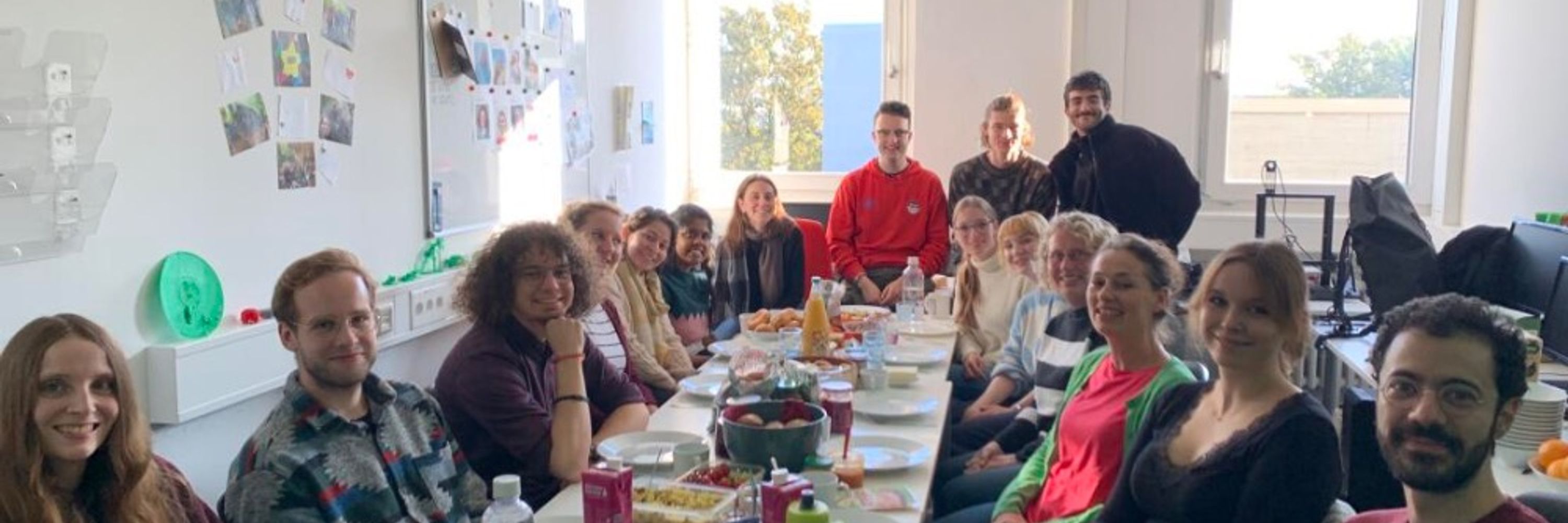
Schubotz Lab
@schubotzlab.bsky.social
We are the Schubotz Lab at the University of Münster - we study event processing, learning and decision making, and the role of predictions in human cognition.
https://www.uni-muenster.de/PsyIFP/AESchubotz/en/index.html
https://www.uni-muenster.de/PsyIFP/AESchubotz/en/index.html
He also gave an oral presentation on how event outcomes influence the relationship between future thinking and remembering. Participants changed their assessment of how important elections were depending on whether the elections went their way or not - showing strong self-serving biases.

June 4, 2025 at 8:31 AM
He also gave an oral presentation on how event outcomes influence the relationship between future thinking and remembering. Participants changed their assessment of how important elections were depending on whether the elections went their way or not - showing strong self-serving biases.
Marius @mariusboeltzig.bsky.social presented his poster on the influence of prediction error size on memory - showing that large prediction errors lead to distinct encoding of new episodes, while keeping old ones intact.

June 4, 2025 at 8:31 AM
Marius @mariusboeltzig.bsky.social presented his poster on the influence of prediction error size on memory - showing that large prediction errors lead to distinct encoding of new episodes, while keeping old ones intact.
Sophie @ssiestrup.bsky.social presented a pre-data poster about her new project. In a line of studies, she will investigate how prediction errors can lead to the integration or segregation of memory traces using behavioural and fMRI data.

June 4, 2025 at 8:31 AM
Sophie @ssiestrup.bsky.social presented a pre-data poster about her new project. In a line of studies, she will investigate how prediction errors can lead to the integration or segregation of memory traces using behavioural and fMRI data.
Nina @nliedtke.bsky.social presented a poster showcasing her current work on initial prediction errors. Instead of inducing episodic memory errors, she focused on spontaneous errors arising during the first exposure to the experimental stimuli.

June 4, 2025 at 8:31 AM
Nina @nliedtke.bsky.social presented a poster showcasing her current work on initial prediction errors. Instead of inducing episodic memory errors, she focused on spontaneous errors arising during the first exposure to the experimental stimuli.
The program at @unimuenster.bsky.social was set up last year and involves a lot of practical research insights, including lab rotations, analysis workshops, and even a brain dissection course. Check out the details here: www.uni-muenster.de/Psychologie/....
MSc Cognitive Neuroscience
Psychologie
www.uni-muenster.de
November 27, 2024 at 8:06 AM
The program at @unimuenster.bsky.social was set up last year and involves a lot of practical research insights, including lab rotations, analysis workshops, and even a brain dissection course. Check out the details here: www.uni-muenster.de/Psychologie/....
We would like to thank Prof. Jorge Sepulcre and @janafehring.bsky.social for their incredible support in this project. It was a pleasure and an honour to work with both of them.
Preliminary results of this paper were already presented at this year's OHBM in Seoul.
Preliminary results of this paper were already presented at this year's OHBM in Seoul.
November 4, 2024 at 12:56 PM
We would like to thank Prof. Jorge Sepulcre and @janafehring.bsky.social for their incredible support in this project. It was a pleasure and an honour to work with both of them.
Preliminary results of this paper were already presented at this year's OHBM in Seoul.
Preliminary results of this paper were already presented at this year's OHBM in Seoul.
The model comparison determined the uni-to-multimodal gradient based on the atlas proposed in Ji et al. (2019) as the most suitable organizational scheme. We discuss microstructural differences that could explain how this organizational scheme can shape the cortical chronotopy.
November 4, 2024 at 12:56 PM
The model comparison determined the uni-to-multimodal gradient based on the atlas proposed in Ji et al. (2019) as the most suitable organizational scheme. We discuss microstructural differences that could explain how this organizational scheme can shape the cortical chronotopy.
... which organization explains the cortical chronotopy the best. In this context we developed a new, data-driven approach to determine the uni-to-multimodal gradient based on stepwise functional connectivity.
November 4, 2024 at 12:56 PM
... which organization explains the cortical chronotopy the best. In this context we developed a new, data-driven approach to determine the uni-to-multimodal gradient based on stepwise functional connectivity.
We determined the cortical chronotopy at rest and task using autocorrelation decay and inter-subject correlation, respectively and comprehensively compared six different, previously suggested organizational schemes with the help of Bayesian model comparison to determine...
November 4, 2024 at 12:55 PM
We determined the cortical chronotopy at rest and task using autocorrelation decay and inter-subject correlation, respectively and comprehensively compared six different, previously suggested organizational schemes with the help of Bayesian model comparison to determine...
Find his work here:
www.frontiersin.org/journals/beh...
direct.mit.edu/jocn/article...
direct.mit.edu/jocn/article...
www.frontiersin.org/journals/beh...
direct.mit.edu/jocn/article...
direct.mit.edu/jocn/article...

Frontiers | Seeing What I Did (Not): Cerebral and Behavioral Effects of Agency and Perspective on Episodic Memory Re-activation
Intuitively, we assume that we remember episodes better when we actively participated in them and were not mere observers. Independently of this, we can reca...
www.frontiersin.org
September 9, 2024 at 8:01 AM

